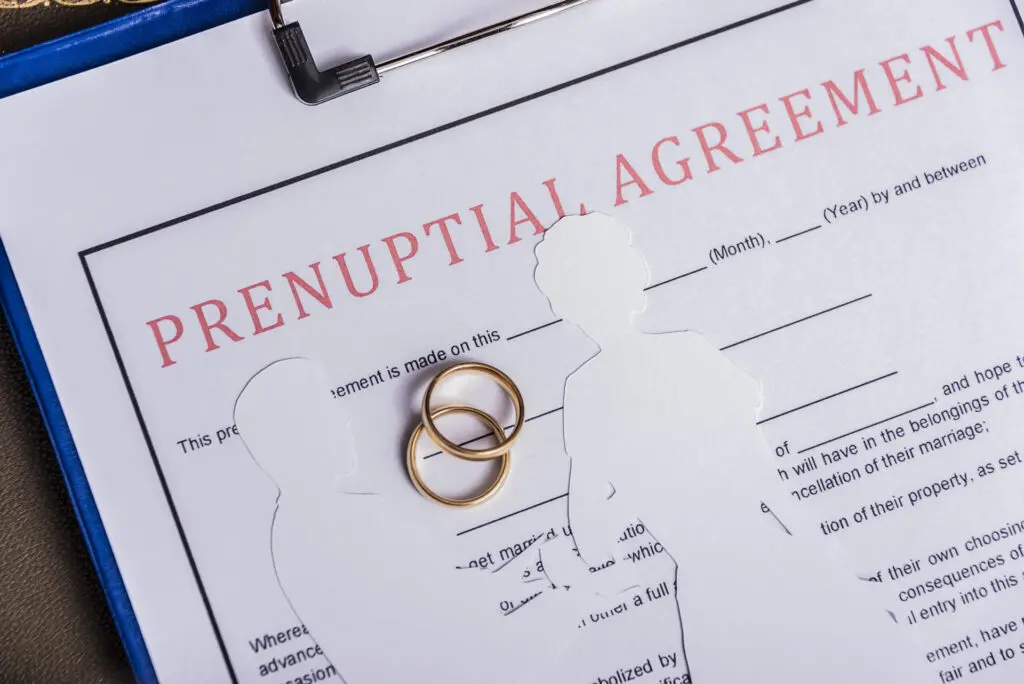Engaged? Congratulations! If you’re considering a prenuptial agreement in the Centennial State, you’re not alone. Prenuptial agreements in Colorado are standard tools used to protect individual financial interests, but also to strengthen your future marriage. But where do you start? There are a few things you should know before diving into your prenuptial agreement journey in Colorado, so let’s get started.
1. Colorado is an equitable distribution state
Let’s talk about what happens in a divorce in Colorado without a prenuptial agreement. In regard to property division, Colorado is an “equitable distribution” state, which means that a court will divide your property equitably, not necessarily 50-50. According to Colo. Rev. Stat. § 14-10-113, a court may look at several factors in determining how to divide a couple’s assets, such as the contributions of each spouse and the economic circumstances of each spouse. These decisions are made on a case-by-case basis, so it can be hard to ascertain exactly what will happen to your property in the event of a divorce. The good news? A prenuptial agreement can override these laws. You can determine exactly how your assets will be divided in a divorce with a prenup, which can provide financial security and predictability.
2. Colorado prenups require financial disclosure
According to CO Rev Stat § 14-2-309, both parties must receive a “reasonably accurate description” of the estimated value of all “property, liabilities, and income” of each party. In practice, this means that each fiancé must write down the accurate values of all of their finances (including assets, income, debt, and future known inheritances) on a financial schedule and attach it to the prenup for their partner to review. This allows each party to fully understand what rights they may be giving up within the agreement, such as the level of property they may be entitled to in a divorce without a prenup. It allows both parties to fairly negotiate and contract with one another fairly by understanding each person’s financial situation.
For example, imagine a scenario where one party has $500,000 in student loans unbeknownst to the other party. This is important information to understand when agreeing to certain terms in a prenup, such as whether each party will be responsible for their own debts or whether certain debts will be treated as joint.
3. Notarization is not required for a valid prenup
The Colorado Uniform Premarital and Marital Agreement Act does not require a prenuptial agreement to be notarized in order for it to be considered valid. However, getting your Colorado prenup notarized can be an added layer of protection for your agreement. The process of notarization confirms that each party signed the agreement, confirmed their identity, and deters certain arguments of fraud in the future. Plus, it’s easy to do and can be done online. And if you’re getting your prenup through HelloPrenup, you can get your notarization done directly through their platform, so you never have to leave your house!
4. A lawyer is not required, but access to a lawyer is required
Hiring a lawyer is not a prerequisite to a valid and enforceable agreement in Colorado. However, according to CO Rev Stat § 14-2-309, each party needs to have “access” to legal counsel. This means both people have enough time to decide whether to retain a lawyer and locate one, get their advice, and consider such advice. For example, if one spouse is presented with the prenuptial agreement a few minutes before walking down the aisle, they likely don’t have a meaningful chance to hire a lawyer, get their advice, and consider such advice. Bottom line? Prenup lawyers are not required for a Colorado prenup, but each person should have the opportunity to hire one if they want one.
5. Prenups can actually strengthen your marriage
Did you know that prenups can actually strengthen your marriage? The act of getting a prenuptial agreement forces couples to discuss difficult topics—retirement, debt, money management, property ownership, death, inheritances, and so much more. Having these conversations upfront helps the couple align on certain matters, such as who pays what debt and what happens when each person dies, that can prevent conflict down the road. By aligning on these important matters before walking down the aisle, 83% of couples actually feel closer together afterwards. Win-win!
6. Postnups are enforceable in Colorado, but prenups are still the better choice
Some people wonder what the difference between a prenup and a postnup is and which agreement makes more sense for them. The answer is (usually) pretty straightforward: prenups are usually the better option because they tend to be more enforceable. Why? Because parties entering into a postnup are attempting to modify rights they already have through marriage, whereas in a prenup you are altering rights before you have them. However, postnuptial agreements are enforceable under the Uniform Premarital and Marital Agreement Act, so if you’re already married and cannot get a prenup, a postnup is still a good choice.
7. What you can include in a Colorado prenup
The “meat and potatoes” of a prenuptial agreement is the division of property in a divorce—i.e., making sure certain existing assets and future assets stay in the hands of one or both parties. For example, making sure a certain investment account, plus all of its appreciation, stays the property of the person who brought it into the marriage. Another common clause in prenups is spousal support. These clauses talk about what spousal support may be allowed in a divorce (if any). This can be helpful for couples who want to ensure all ties are cut in the event of a divorce.
Then, there are all of the other miscellaneous clauses, such as:
- Lump sum clauses (payment of a lump sum from the wealthier spouse to the less wealthy spouse upon divorce)
- Primary residence clauses (who can remain in the marital home upon divorce for a period of time)
- Spousal inheritance of the other spouse’s estate upon death (whether one spouse can inherit from the other’s estate if they die while married)
- Ownership of inheritances and gifts from third parties (such as future inheritances from your parents)
- Pet custody
- Mediation clauses
- And more.
One topic to steer clear of is child custody and child support clauses—these are off limits in Colorado prenups and must be dealt with at the time of divorce by a court.
The bottom line on prenuptial agreements in Colorado
The takeaway here is that if you’re getting a prenup in Colorado, you should make sure that you follow the laws of the state—things like financial disclosure and access to independent legal counsel are key. Understanding what happens without a prenup in a divorce is also helpful to understand what you want to include in your prenup. And, finally, getting a prenup does more than just protect individual interests—it also promotes healthy conversations, creating a stronger future marriage. Happy prenup planning!






